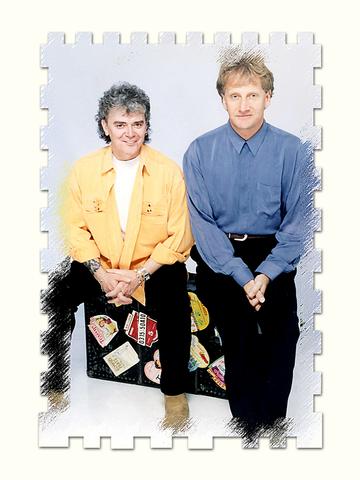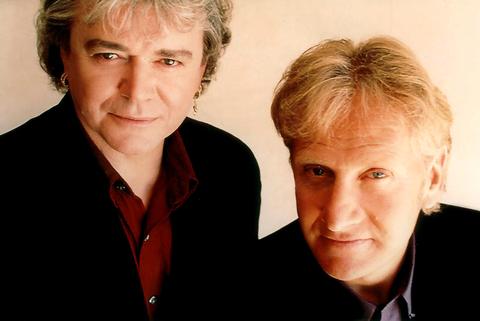Even though four years have passed since their last visit, Taiwan hasn't forgotten about soft rockers Air Supply. And even though they've come to Taiwan a dozen times, their concerts always sell out.
Speaking about the band's success in Taiwan, and in Asia in general, lead singer Russel Hitchcock said in an interview with the Taipei Times that their extensive touring schedule in Asia over the years has engendered fan loyalty. "We have many fans who have grown up with us," says Hitchcock, whose words are quite true for Taiwanese in their 30s, who were raised on a steady diet of Western pop music and likely remember the band's first hit Lost in Love, released way back in 1977.

PHOTO: COURTESY OF AIR SUPPLY
"I also believe that because we have a great show when we perform live, people always love to come out and see us time and time again," says Hitchcock, who further credits his long-time partner and the band's composer, Graham Russell, for the band's success. "Of course the biggest reason is the music! I truly believe that Graham Russell has written some of the finest songs ever written."

PHOTO: COURTESY OF AIR SUPPLY
Hitchcock and Russell founded Air Supply in 1975 in Australia, starting out by playing in bars before they launched their first album. The band first came to fame in North America after they were invited to be guest performers for Rod Stewart's band in 1977. From that point, they built a loyal following around the world -- especially in Asia, where their soft rock was particularly welcomed by audiences -- by having a dozen hits in the 1980s and 11 albums spanning three decades.
After releasing their last album in 1999, the band has turned its efforts toward touring, instead of putting out new albums. "We are always on the road! We have recently finished tours in Mexico and Central America and after this trip in Asia we will take some time off," Hitchcock said. The band's current Asia tour has taken them to Brunei and Hong Kong, and after Taiwan the band will head to Indonesia.
Hitchcock said he is particularly fond of Asia and especially Taiwan, where his albums still sell and fans still flock to the band's concerts.
"We have been to Taiwan so many times and have had many wonderful experiences," Hitchcock recalls. "One of the biggest thrills was meeting the mayor of Taipei several years ago and being made `honorary citizens' of Taiwan."
Hitchcock also said time hasn't slowed down the band one bit. "We always strive to become better at what we do whether it is in the studio or on the stage. We have had many years in the business and I know that we have matured both personally and musically during that time. Graham is writing wonderful songs still. The essence of Air Supply remains what it always has been, great songs, great melodies and a very distinctive vocal style."
The band has apparently hit the jackpot in Taiwan, selling over 400,000 copies of a recent greatest hits album. Carrie Ao (敖琴君), of BMG Music Taiwan, said in reference to the band's popularity: "They're ideal love songs, really easy listening. Nothing like theirs has been heard elsewhere. You feel a little bit of dancing, or rock, in these groups, but fans go after the real mellow songs, and that's a unique point of Air Supply." Another compilation titled The Ultimate Collection -- Millennium is set to be released later this year.
For this weekend's concerts, the band will perform their hits from the 1980s and some from the 1990s, such as Strong Strong Wind and Without You. They will also cover some classic love songs, including Celine Dion's The Power of Love and Dan Fogelberg's Longer. And as a special treat, Russell has composed some new songs for this tour, among them a new single The Scene.
Performance Notes
What: Air Supply:25th anniversary concert (空中補給站合唱團25週年告別演唱會)
When & Where: Nov. 17, Kaohsiung County Fengshan Stadium (高雄縣立鳳山體育館) and Nov. 18, Dr Sun Yat-sen Memorial Hall (台北國父紀念館)
Tickets: Kaohsiung, NT$1,200 and NT$700; Taipei NT$600 to NT$3,000.

On April 26, The Lancet published a letter from two doctors at Taichung-based China Medical University Hospital (CMUH) warning that “Taiwan’s Health Care System is on the Brink of Collapse.” The authors said that “Years of policy inaction and mismanagement of resources have led to the National Health Insurance system operating under unsustainable conditions.” The pushback was immediate. Errors in the paper were quickly identified and publicized, to discredit the authors (the hospital apologized). CNA reported that CMUH said the letter described Taiwan in 2021 as having 62 nurses per 10,000 people, when the correct number was 78 nurses per 10,000

As we live longer, our risk of cognitive impairment is increasing. How can we delay the onset of symptoms? Do we have to give up every indulgence or can small changes make a difference? We asked neurologists for tips on how to keep our brains healthy for life. TAKE CARE OF YOUR HEALTH “All of the sensible things that apply to bodily health apply to brain health,” says Suzanne O’Sullivan, a consultant in neurology at the National Hospital for Neurology and Neurosurgery in London, and the author of The Age of Diagnosis. “When you’re 20, you can get away with absolute

May 5 to May 11 What started out as friction between Taiwanese students at Taichung First High School and a Japanese head cook escalated dramatically over the first two weeks of May 1927. It began on April 30 when the cook’s wife knew that lotus starch used in that night’s dinner had rat feces in it, but failed to inform staff until the meal was already prepared. The students believed that her silence was intentional, and filed a complaint. The school’s Japanese administrators sided with the cook’s family, dismissing the students as troublemakers and clamping down on their freedoms — with

As Donald Trump’s executive order in March led to the shuttering of Voice of America (VOA) — the global broadcaster whose roots date back to the fight against Nazi propaganda — he quickly attracted support from figures not used to aligning themselves with any US administration. Trump had ordered the US Agency for Global Media, the federal agency that funds VOA and other groups promoting independent journalism overseas, to be “eliminated to the maximum extent consistent with applicable law.” The decision suddenly halted programming in 49 languages to more than 425 million people. In Moscow, Margarita Simonyan, the hardline editor-in-chief of the